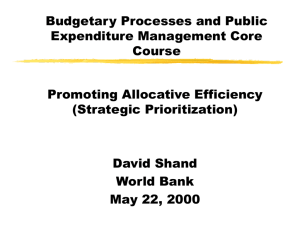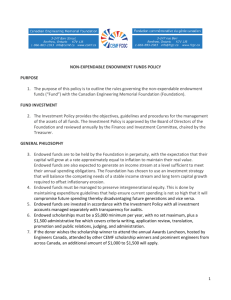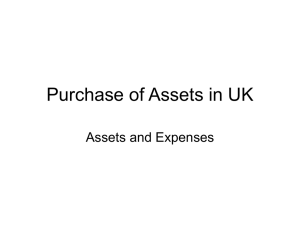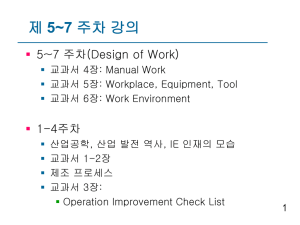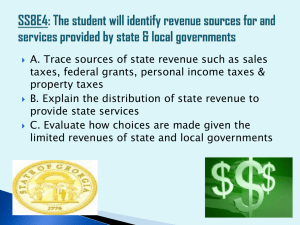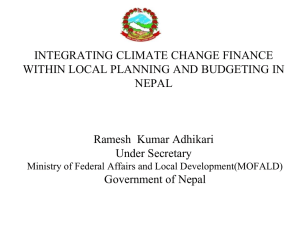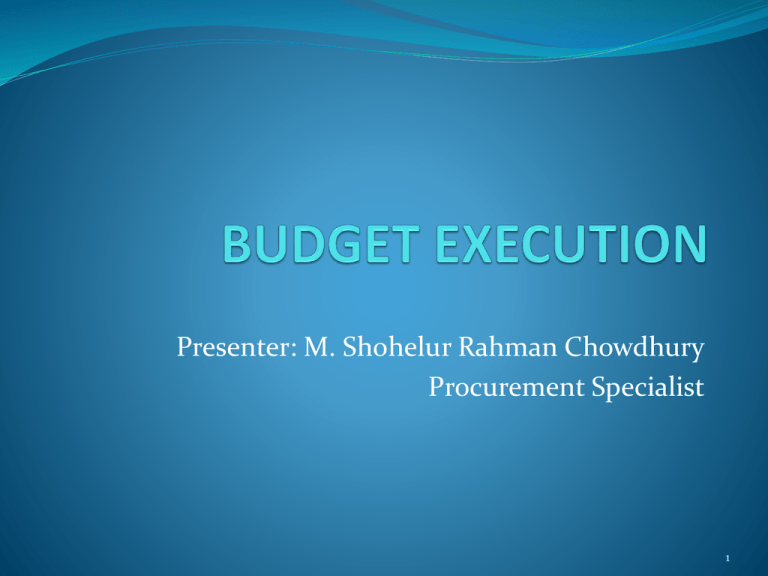
Presenter: M. Shohelur Rahman Chowdhury
Procurement Specialist
1
Budget execution is the phase
when resources are used to
implement policies
incorporated in the budget.
2
Requirements for budget execution
Compliance - Ensuring that the budget will be
implemented in conformity with the legislature’s
authorization
Adaptation - Adapting the execution of the budget to
changes in the economic environment
Sound Management - Resolving problems met in
program implementation and preventing any risk of
abuse and corruption
3
Budget execution cycle
Authorization
and
apportionment
Payment
Issuance of
payment order
Commitment
Acquisition and
verification
4
Authorization and Apportionment Stage
A warrant or a decree authorizes line ministries to use the
appropriations or a part of the appropriations
Line ministries (main spending units) apportion the
authorization to spend to their subordinate spending units
Authorization is generally granted for the entire fiscal year
In British Commonwealth countries it is granted for shorter
period
Ministry of finance may freeze a part of the approved
appropriations for prudent budget management
Funds should be allocated to spending units as soon as the
budget is approved
5
Commitment stage
Commitment stage is when a future obligation to pay
is incurred
For goods and services commitment means legal
commitment
Commitment entails an obligation to pay
6
Verification stage
The verification stage immediately follows the
deliveries
Verification is the conformity of the delivered goods,
or rendered services
For debt service, personnel expenditures and a few
other expenditure items the verification stage and the
commitment stage are combined
7
Payment Order Stage
After verification of goods and services the authorizing
officer issues a payment order
Expenditure is recognized and recorded in books of
the public accountant and in the books of the
authorizing officer
8
Payment stage
Bill is paid by cash or cheque or electronic fund
transfer
At this stage comparison with bank statements should
be systematically carried out
Issue of cheques at the end of the year may lead to
high fiduciary risks
9
Compliance control in budget execution
Why compliance control?
To prevent blatant cases of misuse of appropriation
Overspending
Irregularities
10
Compliance control in budget execution
At commitment stage verify that
The proposal to spend has been approved by an
authorized person
Money has been appropriated for the purpose stated in
the budget
Sufficient funds remain available in the appropriate
category of expenditure
The expenditure is classified in the correct way
11
Compliance control in budget execution
At verification stage the documentary evidence that
the goods have been received and services were carried
out must be verified
The expenditure has been properly committed
The invoice and other documents requesting payment
are complete
The creditor is correctly identified
After final payment examine and scrutinize the
expenditure concerned and report any irregularity
12
Compliance control in budget execution
At verification stage the documentary evidence that the
goods have been received and services were carried out
must be verified
The expenditure has been properly committed
The invoice and other documents requesting payment are
complete
The creditor is correctly identified
13
Compliance control in budget execution
Commitment may be made through different channels
which may be upstream from the annual budget cycle
Expenditure in utilities such as electricity and
telecommunication expenditure
Staff recruitment
Contingent liabilities
14
Implementation and Budgetary Expenditure
Source: Allen and Tommasi 2001
15
Issues in managing and monitoring
budget execution
Distribution of responsibilities
Ministry of finance
Line ministries
Spending units
Treasury
Period covered: Annual Rule
Transfer within the appropriations
Sequestrations
In-year budget revision
16
Treasury function
Cash management
Management of government bank accounts
Accounting and reporting
Financial planning and forecasting of cash flows
Management of government debt and guarantees
Administration of foreign aids
Financial asset management
17
Objectives of cash management
Controlling spending in the aggregate
Implementing the budget efficiently
Minimizing the cost of government borrowing
Maximizing return o excess operating cash balances
18
What’s the money for?
Performance is not a simple concept
("Achievement”,"realization","fulfillment')
“Performance” can be subjective (for effort) or objective
(for results).
Choose results-orientation, but don’t forget the effort
dimension.
Also, the "results" must be appropriately defined, and an
exclusive focus on results without respecting process will
weaken process and eventually produce bad results
“Performance” is the achievement of agreed results within resources
and time provided, without diluting quality and respecting the
prevailing norms of due process.
(Source: Schiavo-Campo)
19
THE FOUR "P'S" OF
BUDGETING PERFORMANCE
Traditional paradigm: Probity and
Propriety
New paradigm: Policy and Performance
Beware of dichotomies – All Four P’s are
essential to execute well the budget, and
foster both integrity and operational
efficiency.
20
The CREAM of performance
A performance indicator must be:
Clear
Relevant
Economic
Adequate
Monitorable
Never use either one single indicator or too many
indicators
(Source: Schiavo-Campo)
21
THE BOTTOM LINE
It is possible to execute badly a good and realistic
budget; it is not possible to execute well a bad and
unrealistic budget.
International experience demonstrates that
strengthening efficiency and effectiveness in budget
execution cannot be accomplished by excessive
controls, but by introducing into the budget
management system: A systematic, robust, and
transparent dialogue on results.
(Source: Schiavo-Campo)
22
23
THANK YOU
24

